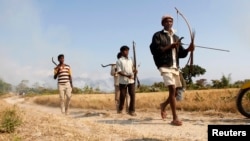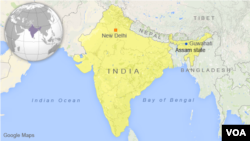Hundreds of protesters have demonstrated in northeastern India to express anger about this week's killing of 76 people by tribal militants in coordinated attacks.
The protesters gathered Friday in Guwahati, the main city in Assam state, carrying banners that denounced the indigenous separatist group suspected of the attacks.
They also accused the provincial government of failing to provide security to the people. One protester said the root cause of a decade-long terror problem in Assam is that there is a "nexus between politician and insurgents."
India's Prime Minister Narendra Modi called the attacks in Assam state late Tuesday "an act of cowardice." President Pranab Mukherjee said "such acts of terror and violence must be put down with a firm hand."
Authorities have blamed the National Democratic Front of Bodoland (NDFB) for the attacks. India has designated the group a terrorist organization and recently launched a crackdown against it.
The NDFB seeks an independent homeland for the indigenous Bodo people. The group has a history of violence against non-Bodos in the area since it formed in 1998. It last struck in May, killing dozens of Muslims.
India has sought cooperation from Bhutan, Myanmar and Bangladesh in the offensive against the tribal militant group.
Some militants may have fled to neighboring Bhutan while their leader was believed to be in Myanmar, which is also known as Burma, officials and police said, prompting calls for cooperation.
“We are determined to hunt down the rebels and destroy their base, both in the country and outside,” India's junior home minister Kiren Rijiju told Reuters.
Assam is one of the seven states that make up India's remote northeast, home to more than 200 tribes and dozens of insurgencies, some seeking greater autonomy and others secession.
The region has trailed the rest of India in economic development and the gap has widened in recent years, fueling discontent. Residents accuse the federal government of plundering the natural resources while ignoring development.
The latest attacks, in which half the victims were women and children, have shaken Prime Minister Narendra Modi's government, which came to power promising economic growth as well as a militarily secure India.
“This is terrorism, there is zero-tolerance for terrorism,” Home Minister Rajnath Singh, who flew to Assam to commiserate with the families of the victims, told reporters.
The northeast is wedged between China, Myanmar, Bangladesh and Bhutan, and militants are known to cross borders that run through thickly forested mountains.
Assam police say the leader of the NDFB, I.K. Sonbijit, is based in Myanmar, from where he controls his cadres.
He is believed to have ordered this week's attacks in retaliation for an army offensive against his group in which he lost 40 men and a large quantity of arms and ammunition.
Some 7,000 villagers have fled their homes in Assam, fearing more attacks from the Bodo militants and are sheltered in relief camps guarded by the army and police.
A portion of this report came from Reuters.






